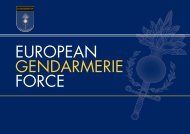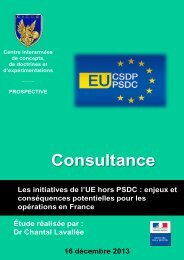Conference
science-research-bulletin-2013-conference
science-research-bulletin-2013-conference
You also want an ePaper? Increase the reach of your titles
YUMPU automatically turns print PDFs into web optimized ePapers that Google loves.
EUROPEAN POLICE SCIENCE AND RESEARCH BULLETIN<br />
SPECIAL CONFERENCE EDITION<br />
thoughts of suicide, anxiety, depression, posttraumatic<br />
stress disorder and burnout). Thus,<br />
the understanding of police officers stress is<br />
crucial when aiming to improve this population<br />
health, as well as improve the overall safety of the<br />
community (Lucas, Weidner, & Janisse, 2013).<br />
Despite the growth of studies investigating the<br />
impact of stress on police officers over the years<br />
(e.g. Violanti & Aron, 1995) further investigation<br />
in this area is needed (Mikkelsen & Burke,<br />
2004), controlling previous methodological<br />
and conceptual shortcomings. Hence, allowing<br />
the development of knowledge and applied<br />
implications ready to be transferred to police<br />
officers training. Previous studies investigating<br />
stress among police officers relied largely on<br />
self-report measures (usually questionnaire<br />
and interview-based) and cross sectional<br />
designs. While it is believed that this research<br />
was important to understand the causes and<br />
consequences of stress among this population, it<br />
did not fully assess the different sources of acute<br />
stress, its magnitude based on physiological<br />
data, and how police officers react and cope<br />
with a stressful encounter (Violanti & Aron,<br />
1995). Furthermore, these methods fail to<br />
address within-person variations and have been<br />
associated with retrospective bias (Nicholls,<br />
Jones, Polman, & Borkoles, 2009). Hence,<br />
findings rely on partial recall and inference<br />
strategies, due to autobiographical memory<br />
construction and retrieval biases challenging the<br />
validity and reliability of the reports (Segerstrom<br />
& O´Connor, 2012).<br />
Nowadays, police forces in most European<br />
countries face extremely challenging times. These<br />
are due to a combination of factors including<br />
open borders, drug trafficking, terrorism,<br />
multicultural diversity and inclusion and the<br />
overall use of new technologies in contemporary<br />
life (Benyon, 1994; Oakley, 2001). Although<br />
previous studies have highlighted the effects<br />
of acute organisational and operational stress<br />
among police officers across different European<br />
countries (e.g., Kop et al., 1999; Biggam, Power,<br />
Macdonald, Carcaldy, & Moodie, 1997; Queirós,<br />
Kaiseler & Silva, 2013; Recasens i Brunet,<br />
Basanta, Agra, Queirós, & Selmini, 2009), little is<br />
known about the effects of these contemporary<br />
demands on police officers occupational health<br />
or whether they are somewhat similar or<br />
completely different across European countries.<br />
In an attempt to understand this relationship and<br />
reflect on best practices on police occupational<br />
health in Europe, it seems crucial to conduct<br />
European comparative research, contributing<br />
to the development of a more qualified police<br />
training system ‘capable of responding quickly<br />
and intelligently to the accelerating pace of social<br />
change’ (MacDonald et al., 1987, p.4). Although<br />
European comparative studies among police<br />
officers have strong theoretical and applied<br />
implications at an individual and institutional<br />
level, little work has been conducted in this area,<br />
mainly due the difficulties associated with the<br />
research process and described in the following<br />
lines.<br />
Firstly, as suggested by Weisburd and Neyroud<br />
(2011) there is still a gap between science and<br />
policing. In other words, on the one hand, police<br />
personnel complicate the use of results from<br />
academic research and knowledge. On the other<br />
hand, some academics ignore the real scenarios<br />
in which the police operate. Additionally, the<br />
difficulties researchers face when aiming to<br />
conduct research among police institutions,<br />
such as the access to data collection procedures<br />
(Mathur, 1999), should also be seen as an<br />
explanation for the gap between science and<br />
policing.<br />
Secondly, there are a diversity of police forces<br />
and respective duties across European countries<br />
(Vertovec, 2007), which difficult comparisons<br />
between countries. Additionally, the language<br />
and cultural barriers also difficult the use of<br />
standardised occupational health research<br />
methods across European countries. In an<br />
attempt to address this problem, researchers<br />
could probably contemplate the use of more<br />
qualitative research approaches, developed<br />
through European research networks, including<br />
researchers and police personnel from different<br />
countries. Additionally, the inclusion of technology<br />
and the use of interdisciplinary knowledge when<br />
aiming to compare European police officers’<br />
occupational health are also powerful tools to<br />
consider. These, will not only overcome simplistic<br />
and traditional methodologies previously used,<br />
but will also allow comparisons of police officers<br />
performance under different European real<br />
world scenarios. An example of an occupational<br />
health project assessing stress and coping<br />
among police officers, including technology and<br />
interdisciplinary knowledge, was developed in<br />
Portugal — SCOPE (Stress and Coping among<br />
Portuguese Police Officers - http://www.fpce.<br />
up.pt/scope/index.html ) funded by a Marie<br />
Curie Action. The ambulatory research tool<br />
140





